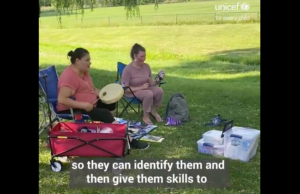Indigenous land-based program highlighted by UNICEF Canada

By Rick Garrick
TORONTO — Native Child and Family Services of Toronto’s (NCFST) land-based program was highlighted on Orange Shirt Day in a UNICEF Canada One Youth video by Aundeck Omni Kaning’s Reta Red Sky Hamlin.
Hamlin, supervisor at NCFST’s Mount Dennis Aboriginal Child and Family Life Centre, created the video about the Pilot of Trauma-Informed Land-Based Response to COVID-19 program after UNICEF Canada approached NCFST about making a video.
“I was really honoured and excited and happy to highlight the work that was done but also the teams I worked with — I tried to make sure I got them in the filming I was doing as well,” Hamlin says. “I wanted to do the core questions they were asking about what we were doing [and] I wanted to be on the land when I was answering those so I could just work that out together.”
Hamlin says UNICEF Canada staff provided her with instructions on how to use her phone to film the video.
“They told me which side of the camera was better to use and how they wanted me to hold the phone,” Hamlin says. “I did have a lot of fun with filming it.”
NCFST launched the land-based program on June 15 to offer an opportunity for families to participate in programming on the land in a park near the Mount Dennis Aboriginal Child and Family Life Centre during the coronavirus disease 2019 (COVID-19) pandemic. The program currently offers a morning session at 10:30 a.m. and an afternoon session at 1 p.m.
“We are looking to do more things after school as well,” Hamlin says. “We have some social media projects that we’re doing after school — we’re going to be doing some ribbon skirt and ribbon shirt making, we’re going to do some quill earrings.”
Jeffrey Schiffer, executive director at NCFST, says that according to a six-week rapid-assessment evaluation NCFST did with the Hospital for Sick Children and the University of Toronto, there were improvements in mental health among participants in the land-based program.
“We found that 97 per cent of the families that participated in this program saw improvements in mental health and reductions in anxiety and depression,” Schiffer says. “They felt more connected to each other as family and more connected to culture, so that’s exactly why we need to do programs like this.”

Schiffer says the program enabled families who had been self-isolating to get out of their homes and onto the land so they could participate in culture and also connect with NCFST staff.
“We saw and recognized that members of the community were really struggling and we wanted to do what we can to support them,” Schiffer says.
Schiffer says NCFST has been in discussions with the Indigenous Affairs Office at the City of Toronto about creating a structure for the land-based program in the park, noting that the city has a new Indigenous place making strategy for city parks and public spaces.
“We’ve been saying if you want to create spaces for Indigenous people in Toronto, how about creating some permanent structures in parks to keep the snow away and to keep a dry place so we can continue to do this [program] over the fall and winter,” Schiffer says. “We’re hoping that we can continue to do this as long as possible to support families through COVID-19.”
Hamlin’s video is posted online on Twitter.


